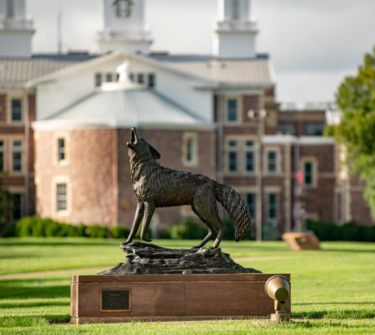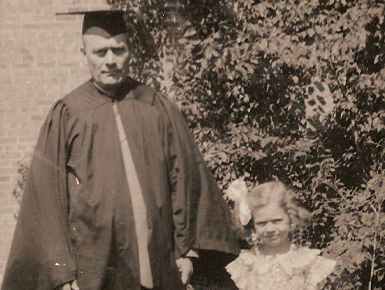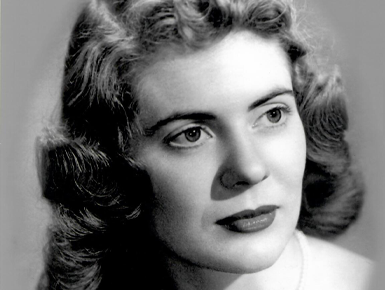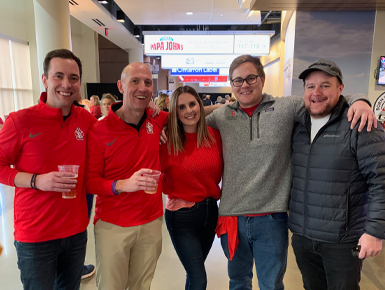

The relationship goes all the way back to when Margaret Cash Wegner’s father – Theodore Halla – attended USD Prep School.
At the time, it was common for enrolled students to attend USD Prep School only during the winter quarter when their presence on the farms wasn’t needed, or when circumstances allowed, says Cash Wegner.
After Halla graduated high school in 1903, he entered the workforce so he could afford to attend college.

“I presume he taught, and then he served in World War I, and then finally, he returned to the College of Arts & Sciences, earning his Bachelor of Arts in 1923,” Cash Wegner explains. “I think he absolutely loved learning and going to school. All my life I never saw him without a book in his hands.”
After graduation, Halla taught again until he earned enough money to return to USD for law school. He graduated in 1935, and by that time, Cash Wegner had been born.
As an only child growing up during the Great Depression, World War II and the better years following, college was a big goal for Cash Wegner, and she knew that after graduating from Pierre High School, she wanted to pursue her education at USD.

“It was just like having all my friends come right along with me,” Cash Wegner says. “South Dakota’s a wonderful place to grow up because you not only know the young people where you went to school, but you also know those in all the surrounding towns, too.” Cash Wegner, who earned her bachelor’s degree in 1953 and master’s degree in 1985, says she is proud of the fact that she even made it through her education.
“My parents both died before my junior year, and I had no brothers and sisters,” she explains. “But both administrators and faculty treated me so well and were interested that I still had the determination to finish my education. Even without my parents, I was always comfortable at USD because of the humanity of its people.”
Cash Wegner married fellow USD graduate Joseph H. Cash ’49, ’59, who also earned a Ph.D. in the history of the American West from the University of Iowa. Both taught high school in Pierre and Lead, South Dakota, before Joseph H. Cash was hired as a history professor at USD. He would later become the dean of the College of Arts & Sciences, serving in that role for 10 years.
Joseph H. Cash continued to teach and publish, as well as serve the state through his capacity as president of the State Historical Society. In this position, he secured funding from the legislature for the South Dakota Oral History Project. Joseph H. Cash held the Duke Chair in History due to his exemplary leadership of USD’s American Indian Research Project, nationally recognized for its quality, productivity and longevity.
Cash Wegner and Joseph H. Cash had three children – Sheridan Cash Anderson ’75, ’78, Joseph M. Cash ’78 and Meredith Cash Weber ’87 – who have helped carry on the family tradition at USD.
Joseph M. Cash also returned to USD as a medical school assistant professor for four years of his career.
In total, four generations of the Cash family have attended the university so far.
This includes Robert Anderson, a 1977 graduate of the USD Knudson School of Law, who married Sheridan Cash Anderson.
“When I married into the Cash family, I quickly figured out that their roots at USD were strong,” Robert Anderson says. “My roots are not that long, but I would say that they’re almost as strong because of the people I’ve met, the friendships I’ve made and the relationships I’ve had with other USD people since I started law school.”
Sheridan Cash Anderson and Robert Anderson’s son, Cash Anderson, is the fourth generation of the family to attend USD. He earned his bachelor’s degree in 2018 and law degree in 2021.
"I wouldn’t be here if not for USD." - Cash Anderson
Kurt Hackemer, Ph.D., USD’s provost and vice president for academic affairs, shares that the Cash family has been on his mind since he arrived at the university in 1996. At that time, Hackemer was a young historian, and although Joseph H. Cash had since passed, he knew he was a legendary figure.
“He was really important in writing the history of the state of South Dakota, especially mining history,” Hackemer says.
A lot of what Hackemer learned about Joseph H. Cash was in the impact he had in setting up the South Dakota Oral History Project and the American Indian Research Project.
“Those projects were pioneering in terms of what they did with oral history,” Hackemer says. “At a time when oral history was not really well received, Joe created a lot of the methods.”
Hackemer notes Joseph H. Cash had a special passion for South Dakota history and was actively involved in the State Historical Society as its president and in building its headquarters in Pierre.
Hackemer’s connection with the Cash family extends to when he had Cash Anderson as a student. “Cash comes from a family who values learning and reading,” Hackemer says. “That’s just part of their DNA.”
He remembers Cash Anderson as being thoughtful in class and absorbed in “everything,” but his fondest memories come from the interactions they had outside class.
“When you get those students who think very carefully about what it is you’re talking about and process the information, and then want to chat about it and do so in a really thoughtful way, those are just your favorite students,” Hackemer says, adding that Cash Anderson loves history the way his entire family does.
Hackemer believes that the Cash family has made an impact on the university throughout all four generations of their relationship with USD.
“I think about Margaret Cash Wegner’s mother working as an assistant to Dean Herbert Schell when he was running the graduate school in the 1930s and 1940s,” Hackemer says. “USD just seems to run through – it’s like the lifeblood of the family. There are so many connections to USD, from the undergraduate experience to the law school experience.”
Neil Fulton, J.D., dean of the USD Knudson School of Law, shares his take on the Cash family.

“There are folks who do things for their community and their university and enjoy the attention,” he says. “And then there are some folks who do it because it’s the right thing. The Cash family has a deep commitment to USD through philanthropy, through attendance, through support and through coming back in so many ways because it’s the right thing to do and because they care.”
Ultimately, it’s fitting that the Cash family was named USD’s Legacy Family of the Year.
“You can’t really write and think about the history and legacy of USD without the Cash family,” Hackemer says. “This is a family who thinks broadly about what the University of South Dakota is, and what impact it’s going to have on the state and the region. That’s why they’re a great family to recognize.”
